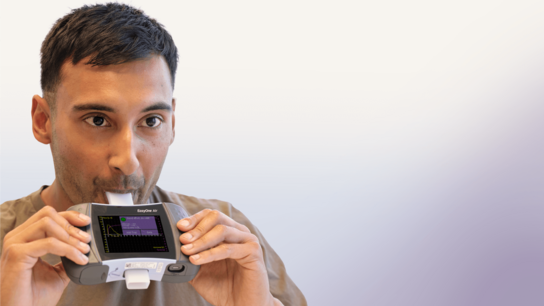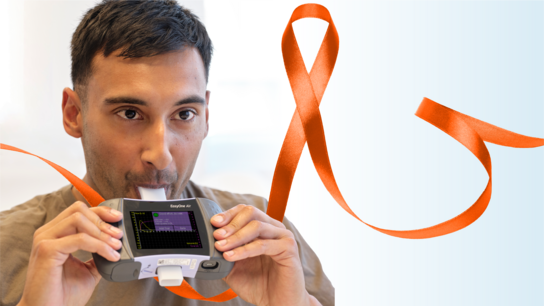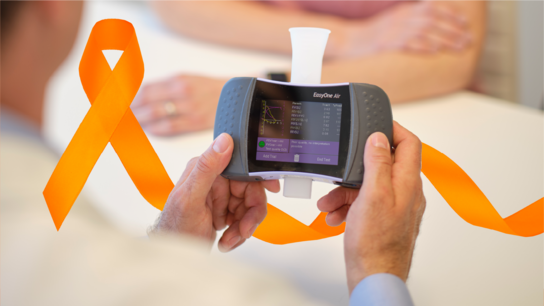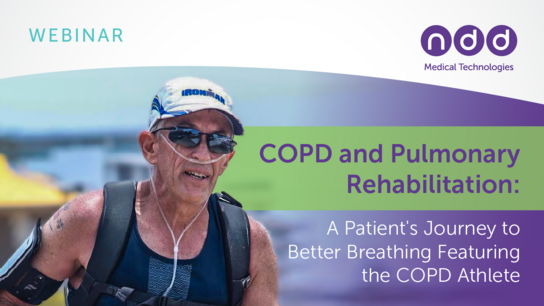COPD Athlete Russell Winwood
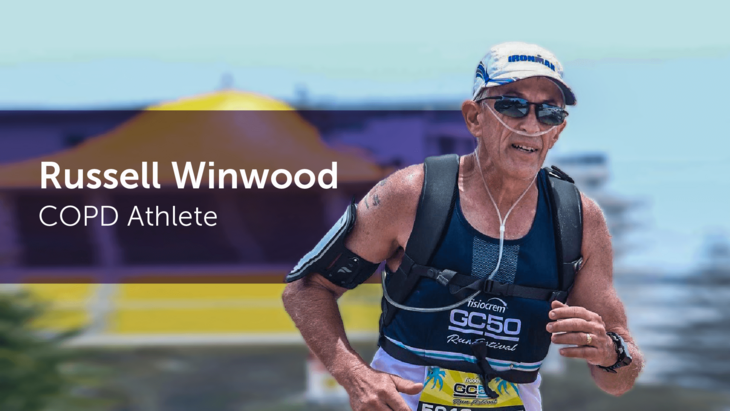
Table of contents
COPD doesn't have to define you, and Russell Winwood is living proof. Known as the "COPD athlete," Russell demonstrates that people with COPD can control their lung health, continue to live active lives, and achieve their goals.
After receiving a COPD diagnosis in 2011, Russell shares his story to raise awareness about COPD with the hopes of helping others.
Russell's story
After years of unmanaged asthma and 20 years of smoking on and off, Russell was diagnosed with COPD at age 44. While training for an Ironman in Australia, he noticed he was becoming increasingly short of breath. During his training, he'd cycle through getting a lung infection, healing, and continuing his training, but eventually, he would get sick again.
After about a year of shortness of breath and recurring lung infections, he saw his doctor and took a spirometry test. The spirometry test showed an FEV1 of 22% (A normal FEV1 is 80-100%). After four weeks of steroids, a lung function test at a lung clinic showed no improvement. This is when his doctor diagnosed him with COPD.
COPD doesn't define you
After about 3 to 4 months, Russell decided that COPD would not slow him down.
I wanted to see my kids grow up, I wanted to see them get married and see my grandkids.
Russell made a goal to get back into exercising. However, with the intensity of his training, he continued to get sick. At that time, even walking felt like a struggle. Determined to find a way, he started slow; he began with short walks around the block, extending his walks as his body allowed. He walked every day, making exercise a part of his lifestyle.
Improving life with lifestyle changes
Russell didn't allow COPD to stop him. He said that with COPD, you must learn to self-manage and become proactive; your doctor can only do so much for you, and the rest is on you.
Exercise and lifestyle changes can make your quality of life so much better
At the time of his diagnosis, there weren't many pulmonary rehabilitation programs in Australia, so Russell completed his own exercise program. But over the years, he participated in many pulmonary rehabilitation programs worldwide.
Russell's marathons
After being diagnosed with COPD, Russell was determined to get back to his marathon training. Nearly 6 months after being diagnosed, he was back at it by completing three Ironman Triathlons with his wife.
After completing the third Ironman in 2014, he and his wife were looking for something else to do, and his coach's wife suggested joining them in running the New York Marathon. Marathon training is less-involved than triathlon training since it only consists of running compared to all three disciplines.
After the New York Marathon, he decided to complete Abbott's World Marathon Challenge, which consists of six major marathons worldwide.
He then ran the Chicago Marathon and at this time his lung capacity was only around 30%
Although able to complete the runs, his time wasn't improving, so he looked for other changes he could make. And that's when he discovered the ketogenic diet.
The ketogenic diet for COPD
Although the ketogenic (keto) diet has recently increased in popularity, physicians have been using the diet to treat epilepsy for over a century, and it may also help improve lung function.
The keto diet is high in fat and very low in carbohydrates. This way of eating puts the body into a metabolic state of ketosis, breaking down fat and producing ketones as its primary fuel source. Not only has this diet treated epilepsy, but researchers are also studying whether it treats some forms of cancer.
Studies now suggest that people with COPD who follow a ketogenic diet may produce less carbon dioxide, a waste product that people exhale. Since carbohydrates produce more carbon dioxide than fat and protein, limiting carbs may help people with COPD breathe easier.
Russell has been following the ketogenic lifestyle for 5-6 years, noticing quick improvements. After two months, he noticed he used his rescue inhaler less often. After six months, he improved his marathon time, running the London Marathon at his personal best record.
Russell and three researchers have been collecting his data while on the diet, and they published a case study showing that the keto diet can improve COPD. As shown in his case study, his inflammatory markers reduced to a normal range following the keto diet, and his forced expiratory volume (lung test measuring exhaled air) increased by 37.5% compared to before beginning the diet.
More research should be done to explore to benefits of a keto diet for COPD.
Diagnosing COPD
Early diagnosis of COPD provides people with earlier treatment and improved outcomes. However, up to 70% of COPD cases worldwide remain underdiagnosed.
When asked why he thinks people aren't getting diagnosed with COPD, Russell said that people, physicians included, often think of breathlessness as a sign of aging; people are getting older and not as active or conditioned as they once were.
However, Russell pointed out the simplicity of a spirometry test, suggesting that anyone feeling short of breath should get tested. Spirometry, a common lung function test, measures the amount of air you inhale and how much and how fast you exhale. Practitioners use the test to help diagnose COPD, asthma, and other lung conditions.
COPD awareness
It all starts with awareness. Being aware of your overall lung health is an important step to an early diagnosis.
In Russell's case, he participates in many awareness activities to help elevate the message on lung disease. He participates in COPD awareness for World COPD every year in November as part of his awareness efforts. He interviews with local media and various groups in the U.K. and U.S., speaking about how people with COPD can improve their quality of life, getting diagnosed with COPD, and talking to friends and family about the disease.
Never let your disease define you
Even with COPD, there's a way. He never thought he'd run marathons with an oxygen tank on his back, but he's doing it.
This COPD athlete shares his experience, hoping to benefit others. Knowing that he's helped or touched some people is what it's all about for him.
Russell's motto: "Never let your disease define you."
Watch the complete interview below.
Clinical statements come from these sources:
https://pubmed.ncbi.nlm.nih.gov/19049574/
https://www.cancer.gov/publications/dictionaries/cancer-terms/def/ketogenic-diet
https://www.lung.org/lung-health-diseases/lung-disease-lookup/copd/living-with-copd/nutrition
https://www.ruralhealthinfo.org/toolkits/copd/2/prevention-and-risk-reduction/early-diagnosis
https://www.frontiersin.org/articles/10.3389/fmed.2021.699427/full
https://www.emphysemafoundation.org/index.php/about-uss/privacy/83-copd-emphysema-articles/472-a-low-carb-diet-can-help-copd-sufferers
Products
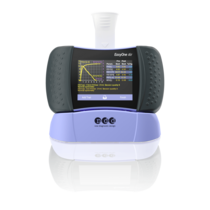
EasyOne® Air
Portable & PC spirometer
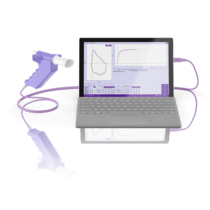
Easy on-PC
PC spirometer


